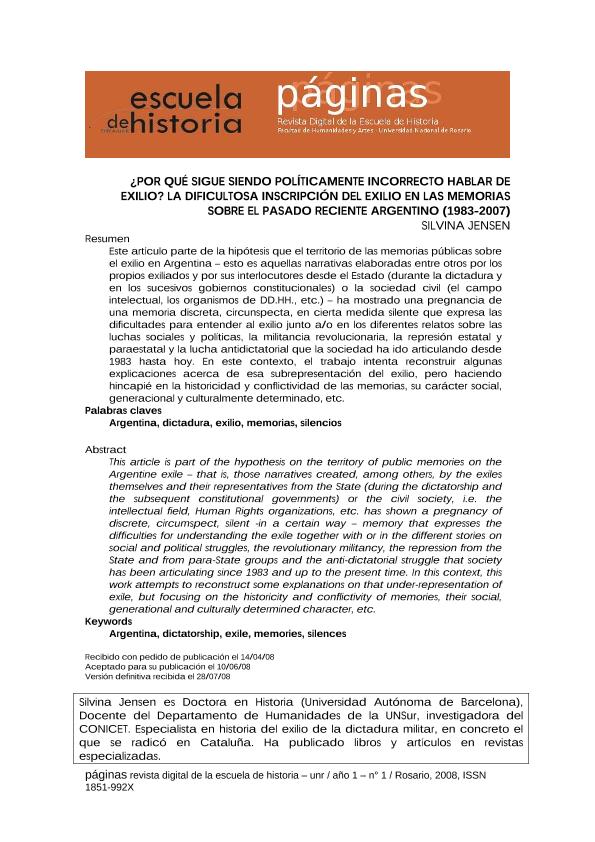Mostrar el registro sencillo del ítem
dc.contributor.author
Jensen, Silvina Inés

dc.date.available
2019-07-01T17:41:14Z
dc.date.issued
2008-12
dc.identifier.citation
Jensen, Silvina Inés; ¿Por qué sigue siendo políticamente incorrecto hablar de exilio?: La dificultosa inscripción del eixlio en las memorias del pasado reciente argentino (1983-2007); Universidad Nacional de Rosario. Facultad de Humanidades y Artes; Páginas; 1; 1; 12-2008; 131-148
dc.identifier.issn
1851-992X
dc.identifier.uri
http://hdl.handle.net/11336/78941
dc.description.abstract
Este artículo parte de la hipótesis que el territorio de las memorias públicas sobre el exilio en Argentina – esto es aquellas narrativas elaboradas entre otros por los propios exiliados y por sus interlocutores desde el Estado (durante la dictadura y en los sucesivos gobiernos constitucionales) o la sociedad civil (el campo intelectual, los organismos de DD.HH., etc.) – ha mostrado una pregnancia de una memoria discreta, circunspecta, en cierta medida silente que expresa las dificultades para entender al exilio junto a/o en los diferentes relatos sobre las luchas sociales y políticas, la militancia revolucionaria, la represión estatal y paraestatal y la lucha antidictatorial que la sociedad ha ido articulando desde 1983 hasta hoy. En este contexto, el trabajo intenta reconstruir algunas explicaciones acerca de esa subrepresentación del exilio, pero haciendo hincapié en la historicidad y conflictividad de las memorias, su carácter social, generacional y culturalmente determinado, etc.
dc.description.abstract
This article is part of the hypothesis on the territory of public memories on the Argentine exile – that is, those narratives created, among others, by the exiles themselves and their representatives from the State (during the dictatorship and the subsequent constitutional governments) or the civil society, i.e. the intellectual field, Human Rights organizations, etc. has shown a pregnancy of discrete, circumspect, silent -in a certain way – memory that expresses the difficulties for understanding the exile together with or in the different stories on social and political struggles, the revolutionary militancy, the repression from the State and from para-State groups and the anti-dictatorial struggle that society has been articulating since 1983 and up to the present time. In this context, this work attempts to reconstruct some explanations on that under-representation of exile, but focusing on the historicity and conflictivity of memories, their social, generational and culturally determined character, etc.
dc.format
application/pdf
dc.language.iso
spa
dc.publisher
Universidad Nacional de Rosario. Facultad de Humanidades y Artes
dc.rights
info:eu-repo/semantics/openAccess
dc.rights.uri
https://creativecommons.org/licenses/by-nc-sa/2.5/ar/
dc.subject
Dictadura Militar
dc.subject
Memorias del Exilio
dc.subject
Silencios
dc.subject
Historia
dc.subject.classification
Historia

dc.subject.classification
Historia y Arqueología

dc.subject.classification
HUMANIDADES

dc.title
¿Por qué sigue siendo políticamente incorrecto hablar de exilio?: La dificultosa inscripción del eixlio en las memorias del pasado reciente argentino (1983-2007)
dc.type
info:eu-repo/semantics/article
dc.type
info:ar-repo/semantics/artículo
dc.type
info:eu-repo/semantics/publishedVersion
dc.date.updated
2019-03-27T13:30:48Z
dc.journal.volume
1
dc.journal.number
1
dc.journal.pagination
131-148
dc.journal.pais
Argentina

dc.journal.ciudad
Rosario
dc.description.fil
Fil: Jensen, Silvina Inés. Consejo Nacional de Investigaciones Científicas y Técnicas; Argentina. Universidad Nacional del Sur. Departamento de Humanidades; Argentina
dc.journal.title
Páginas
dc.relation.alternativeid
info:eu-repo/semantics/altIdentifier/url/http://revistapaginas.unr.edu.ar/index.php/RevPaginas/article/view/177/176
Archivos asociados
